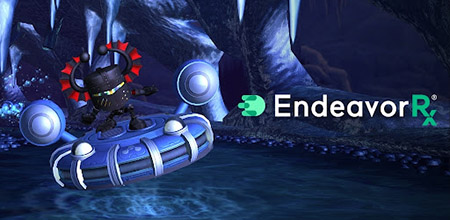Kids, Time To Play Your Medicine: Akili Prepares Launch Of EndeavorRx Video Game For ADHD
Executive Summary
After being first to receive FDA clearance for a prescription-only software to treat ADHD and raising total funding of $230m, Akili plans a US launch in 2022 while targeting other indications.
After nearly a decade building a prescription-based video game platform to help children with attention deficit hyperactivity disorder (ADHD), Akili Interactive Labs’s CEO Eddie Martucci said the company is making plans to market its software to US-based health care providers and patients in the new year.
EndeavorRx became the first prescription-only game-based device to be cleared for marketing by the US Food and Drug Administration under the de novo clearance, the regulatory pathway for low- to moderate-risk devices. ( (Also see "Gaming For Attention: FDA Grants De Novo For Novel ADHD Treatment" - Medtech Insight, 16 Jun, 2020.))
Akili's EndeavorRx game-based therapy
 Akili
Akili
The digital treatment – which "lets kids play their medicine," according to the company's website – was cleared in June 2020 to help improve ADHD for children ages 8-12, based on multiple studies of more than 600 children. EndeavorRx is intended for use as part of a therapeutic program including clinician-directed therapy, medication and/or educational programs, which further address symptoms of ADHD.
“We’ve been on an almost decade-long journey basically pioneering how to build all those things," Martucci told Medtech Insight. "And now we're at the point where we finally have a product that is prescribable – it’s a new medicine class – and behind this capability we built, we are excited to bring many more products through that.”
There are about 6.1 million children in the US with ADHD, according to the Centers for Disease Control and Prevention. Many children with ADHD also have other disorders such as depression, anxiety, and behavior and conduct issues.
Akili’s EndeavorRx software is a digital therapeutic that delivers treatment via an engaging video game. By presenting sensory and motor stimuli, the therapy targets areas of the brain that play a key role in attention function. Children playing the game navigate their character through a course while collecting targets and avoiding bumping into obstacles, which teaches them to focus while managing multiple tasks at the same time.
Martucci said that Akili decided early on to pursue FDA clearance as part of its prescription-oriented business model, which also differentiates it from a wellness product, which, he pointed out, is “a lot cheaper and a lot quicker to get to market.”
Going the regulatory route required Akili to sponsor multiple randomized trials demonstrating that the software was able to change brain physiology and show clinical improvements related to the condition.
The FDA-reviewed data showed improvements in the participants’ attention function as measured by the Test of Variables of Attention (TOVA) Attention Performance Index (API), and other assessment tools, without serious adverse effects. The most common adverse events included frustration, headache, dizziness, emotional reaction and aggression, the FDA said.
“The way we did this is just like any other drug,” Martucci said about the FDA process. “We incorporate gold standard clinical outcomes that have nothing to do with the game interface, but are accepted clinical outcomes related to the condition … The one nuance is there are no previously approved products for a cognitive function, and we think that changed, because how the brain is functioning, how it's processing information, how it's paying attention, that's been kind of relegated outside of medicine. We believe it should be part of medicine.”
The company also received the CE mark in June 2020 but Akili has no current plans to enter the EU market as it is focusing on the US market and its partnership with Shionogi in Japan and Taiwan, Martucci said. The company is sponsoring clinical trials with the Japanese-language version of AKL-T01, the underlying technology of EndeavorRx, with hopes to advance into phase 3 clinical trials. (Also see "Akili Strikes $125m Digital Med Deal With Japanese Partner" - Medtech Insight, 8 Mar, 2019.)
While it is too early to tell whether doctors and patients will embrace EndeavorRx, Martucci said that since gaining FDA clearance for EndeavorRx, the company has been piloting treatment, prescription and fulfillment processes.
“There is no established playbook for digital therapeutics, so we have been piloting EndeavorRx in the US to gather important feedback from families and physicians,” Martucci said.
The therapeutic will be offered through the pharmacy sales channel. This has led Akili’s sales team to focus on things such as building relationships with doctors, understanding barriers to adoption, and investigating preferred ways to deliver the product to patients, he said.
“There is no established playbook for digital therapeutics, so we have been piloting EndeavorRx in the US to gather important feedback from families and physicians.” – Eddie Martucci
The company has raised $230m to date, including a $110m series D round that closed in May, the proceeds of which were used to advance its core technology, fund research and the go-to market approach. Among Akili’s investors are New Leaf Venture Partners, JAZZ Venture Partners, Amgen Ventures and M Ventures, the corporate VC fund of Germany-based Merck KGaA. (Also see "Expert Panel Discusses Trends In Digital Health Investment " - Medtech Insight, 3 Jun, 2019.)
“We're fortunate enough to have raised a good amount of money where we want to invest in getting the basic model right, everything from the distribution infrastructure like, ‘How does a patient actually get this? How does a doctor write a prescription?’ all the way to the business model itself, the right pricing and engagement with your consumer, etc.,” he said.
Reimbursement Remains Barrier
Martucci expects that some insurers will cover the therapeutic, but that will be the minority of cases. EndeavorRx treatment costs $450 for a three-month prescription through an online pharmacy. According to Martucci, that price is on par with other treatments in this space; and it will cost “just under” $300 for self-paying families and patients. Some patients and families may qualify for further reductions or free therapy under the Patient Prescription Access program.
Reimbursement remains a big barrier for many digital therapeutics developers, but Martucci said Akili is “currently on a number of formularies” and in discussions with payers.
 Eddie Martucci, CEO Akili Interactive
Akili Interactive
Eddie Martucci, CEO Akili Interactive
Akili Interactive
“We are also working alongside leaders in the prescription digital therapeutics industry and legislators to enable Medicare and Medicaid coverage,” he said.
He foresees a bright future ahead for digital therapeutics, which is defined by the Digital Therapeutics Alliance as “delivering evidence-based therapeutic interventions, driven by high-quality software programs to prevent, manage, or treat a medical disorder or disease.”
Medtech consultant Jaunt expects the digital therapeutics market to reach $6bn in 2025. A subcategory of digital health solutions, digital therapeutics represents a wide range of technologies and services including wearables, sensors, virtual reality, and video games.
Martucci admits that video games are a unique delivery mechanism for medical treatments.
“Certain types of experiences and stimuli can be used to change how the brain processes information and through gameplay we can put that knowledge to use to improve mental and cognitive health,” he said.
Fun, Yet Powerful Enough To Change The Brain
When Akili was founded in 2011 with licensed technology from the University of San Francisco, it sought to create a platform that would be fun to use, yet powerful enough to change the brain.
Martucci said the idea for Akili came about during a time when big pharmaceutical companies reduced their drug development in neurology and psychiatry. At the same time, technology kept advancing and more people started using their smartphones for more than just communication, which Martucci saw as a huge opportunity. (Also see "Market Intel: Virtual Reality: The New Game In Mental Health Care To Improve Outcomes" - Medtech Insight, 22 Jun, 2017.)
“We got really excited with the idea that we might be able to use technology at a time when everyone else in the digital health world was saying ‘how do we use this new technology to help medicine,” Martucci said. “We had enough insight that there was enough science here to make this work, even though we didn't have a scientific platform to start with. We just thought this concept was powerful.”
Knowing that traditional medicine in mental health, psychiatry and neurology is “stigmatized, cold and scary,” EndeavorRx presents an alternative therapy that Martucci claims has shown to improve underlying cognitive impairments beyond ADHD.
“The core technology in EndeavorRx is disease agnostic and has been shown to improve underlying cognitive impairments associated with many diseases and disorders, including depression, autism and multiple sclerosis and related immune disorders, and even COVID-19 brain fog,” he said.
“We think that about 100 million people in the US alone at some point in their life deal with significant cognitive impairment that become limiting to their quality of life … the potential of a medicine platform that can directly address the cognitive issues and have an amazing experience to it is a potentially huge need and opportunity for that whole set of patients,” he said.
Video games are stigmatized as being addictive, but Martucci said the company is aligned with the American Academy of Pediatrician’s recommendations on “screen time for children,” and its distinction between educational and entertainment screen time.
“We understand that screen time can be of concern to parents and physicians, and the EndeavorRx treatment is limited to approximately 25 minutes of screen exposure per treatment day. This is the time it takes a child to finish the daily treatment’s five missions and will automatically lock after each daily treatment session is completed.”
Using video games as a therapy has seen a sharp rise since the start of the pandemic along with mental telehealth consultations.
Geek Therapy, often referred to as Therapeutic and Applied Geek and Gaming, is a not-for-profit organization that is also advocating for the use of video gaming in therapeutic, educational and community practice. The organization has grown to more than 5,900 members on Facebook.
The US Department of Veterans Affairs has long been using video games to help veterans with problems such as substance abuse disorders and post-traumatic stress disorder. A study of 20 US veterans who were treated for mental health issues and examined how they used video games to further their mental and behavioral health recovery found that video games helped with managing moods and stress, as well as adaptive copying, eudemonic well-being, and socializing.
Martucci said there are a lot of concepts coming out of universities and start-ups that may potentially become marketable therapies, but also pointed to the high bar required to meet regulatory requirements.
“There’s really nothing on the marketplace that we see that is using immersive and exciting consumer-grade on the entertainment front and delivering medicine the way we are,” he said, but he thinks there will be many more to come. “I think it will be a relatively broad field in the future – not just video games – but also sound medicine, immersive VR-based medicine and there’s a lot of potential to use sensory stimulus to treat neurological and related conditions.”
